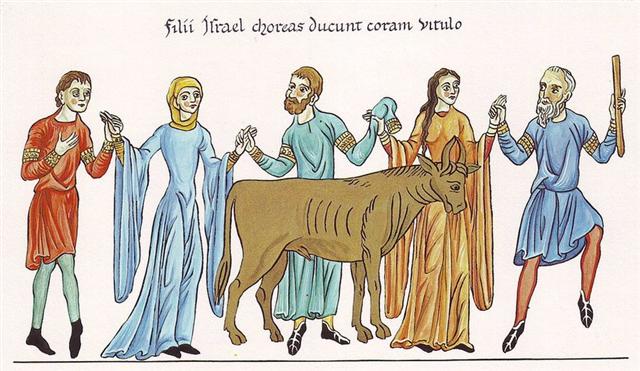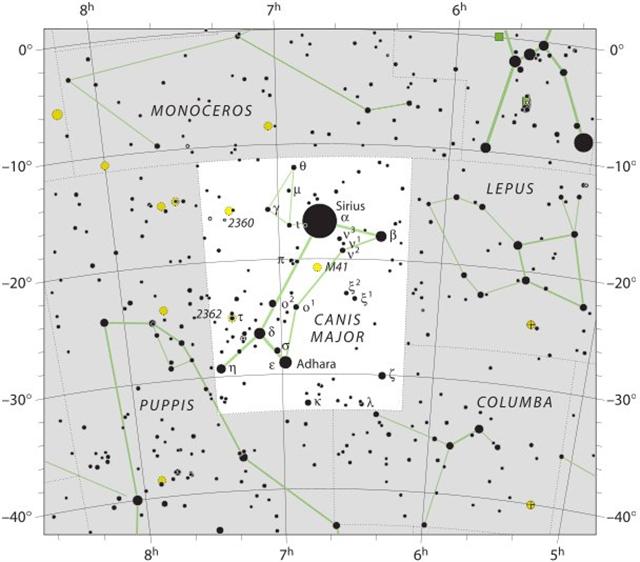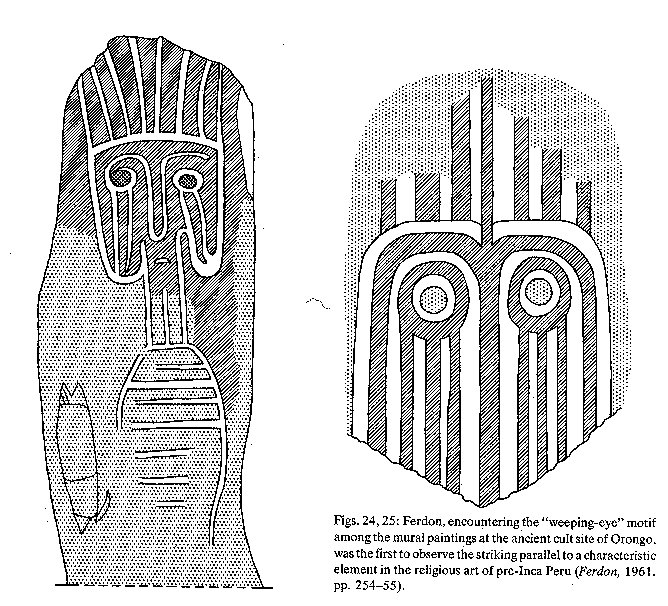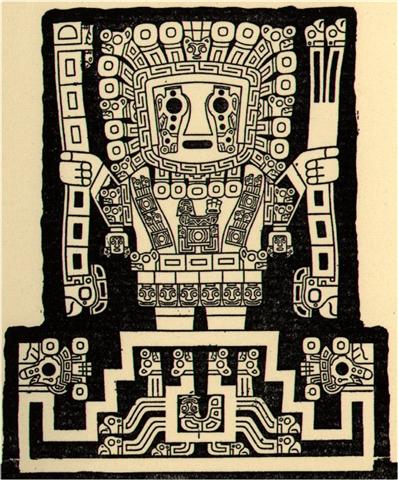2-7. The first-born surely must be a woman, for males cannot give
birth to new generations:
... The older sister of god and man,
La'ila'i, is the firstborn to all the eras of previous
creation. By Hawaiian theory, as firstborn La'ila'i is
the legitimate heir to creation; while as woman she is uniquely
able to transform divine into human life. The issue in her
brothers' struggle to possess her is accordingly cosmological in
scope and political in form. Described in certain genealogies as
twins, the first two brothers are
named simply in the chant as 'Ki'i, a man' and 'Kane,
a god'. But since Ki'i means 'image' and Kane
means 'man', everything has already been said: the statues of
god and man are reversed by La'ila'i's actions. She 'sits
sideways', meaning she takes a second husband, Ki'i, and
her children by the man Ki'i are born before her children
by the god Kane ... In the succeeding generations, the
victory of the human line is secured by the repeated marriages
of the sons of men to the daughters of gods, to the extent that
the descent of the divine Kane is totally absorbed by the
heirs of Ki'i ...
The descent of the divine was totally
absorbed by the heirs of man, similar to how the wise genes of Neanderthal Man had
been totally absorbed in the genes of Homo Sapiens.
|
Jan 4 |
5 (370 → 5 * 74) |
6 (365 + 6 = 371) |
7 |
 |
 |
 |
 |
|
Ea2-20 |
Ea2-21 (53) |
Ea2-22 (2 * 27
→
π) |
Ea2-23 (55) |
|
ki te marama e |
kua oho koe - ki haga o tere
hia |
ma te hokohuki - E te moa e |
ka mau koe i te tao |
|
Tere. 1. To run, to flee, to escape from
a prison. 2. To sail a boat (also: hakatere);
tere vaka, owner of a fishing boat. 3.
(Deap-sea) fisherman; tere kahi, tuna
fisherman; tere ho'ou, novice fisherman, one
who goes deap-sea fishing for the first time.
Penei te huru tûai; he-oho te tere ho'ou ki ruga ki
te hakanonoga; ana ta'e rava'a, he-avai e te tahi
tagata tere vaka i te îka ki a îa mo hakakoa, mo
iri-hakaou ki te hakanonoga i te tahi raá. The
ancient custom was like this: the novice fisherman
would go to a hakanonoga; if he didn't catch
anything, another fisherman would give him fishes to
make him happy so he'd go again one day to the
hakanonoga (more distant fishing zones where
larger fishes are found). Vanaga. To depart, to run,
to take leave, to desert, to escape, to go away, to
flee, fugitive, to sail, to row, to take refuge, to
withdraw, to retreat, to save oneself; terea,
rest, defeat; tetere, to beat a retreat, to
go away, refugee; teretere, to go away,
hurrah; hakatere, to set free, to despatch,
to expel, to let go, to liberate, to conquer,
helmsman; terega, departure, sailing;
teretai, a sailor. Churchill.
Tao.
1. To cook in an oven, to sacrifice. P
Mgv., Mq., Ta.: tao, to cook in an oven. 2.
To carry away. 3. Abscess, bubo, scrofula, boil,
gangrene, ulcer, inflammation, sore. Mgv.:
taotaovere, small red spots showing the approach
of death. Mq.: toopuku, toopuu, boil,
wart, tumor. Ta.: taapu, taapuu,
scrofula on neck and chin. 4. Mgv.: a lance, spear.
Ta.: tao, id. Sa.: tao, id. Ma.:
tao, id. 5. Mgv.: taotaoama, a fish.
Sa.: taotaoama, id. 6. Ta.: taoa,
property, possessions. Ma.: taonga, property,
treasure. Churchill. Sa.: tao, to
bake; taofono, taona'i, to bake food
the day before it is used; tau, the leaves
used to cover an oven. To.: tao, to cook food
in a oven, to bake. Fu.: taò, to put in an
oven, to cook. Niuē:
tao, to
bake. Uvea: tao,
to cook, to bake. Ma., Rapanui: tao,
to bake or cook in a native oven, properly to steam,
to boil with steam. Ta.: tao,
the rocks and leaves with which a pig is covered
when cooking; baked, boiled, cooked. Mq., Mgv., Mg.,
Tongareva: tao,
to bake in an oven ... The word refers to the
specific manner of cookery which involves the pit
oven. The suggestion in the Maori, therefore, does
not mean a different method; it is but an attempt
more precisely to describe the kitchen method, a
very tasty cookery, be it said. The suggestion of
boiling is found only in Tahiti, yet in his
dictionary Bishop Jaussen does not record it under
the word bouillir;
boiling was little known to the Polynesians before
the European introduction of pottery and other
fire-resisting utensils ... Churchill 2.
Kao-kao, v. Haw.,
be red. Root and primary meaning obsolete in Haw.
Sam., tao,
to bake. Marqu., tao,
bake, roast, sacrifice. Tah., tao,
baked, boiled, cooked. Greek, καιω,
Old Att. καω,
to light, kindle, burn, scorch. According to Liddell
and Scott, Pott refers καιω
to Sanskrit çush,
be dry, but Curtius rejects this. In Dravid. (Tamil)
kay, to
be hot, burn. Fornander. |
|
WEZEN (Weight) =
δ
Canis Majoris
(107.1),
τ
Gemini (107.7),
δ
Monocerotis (107.9) |
No star listed (108) |
λ
Gemini (109.4),
WASAT (Middle) = δ Gemini
(109.8)
*68.0 = *109.4 - *41.4 |
No star listed (110) |
|
NOV 2 |
3 |
4 (308 → 68 + 240) |
5 |
 |
The precession carried the Sun earlier and earlier
as observed against the background of the fixed stars.
.jpg)
130 + 125 = 255 = 355 - 100 = 359 - 104.
When the female star marking the
Middle (Was-at, δ
Gemini) nowadays was visible close to the Full Moon
in January 6 (365 + 6 = 371) it should have reminded people of how
this had been
in day 371 - 63 = day 308 (→ 11 * 28) in the
Golden Age of the Bull.
... The verdicts concerning the
familiarity of ancient Near Eastern astronomers with the
Precession depend, indeed, on arbitrary factors; namely,
on the different scholarly opinions about the difficulty
of the task. Ernst Dittrich, for instance, remarked that
one should not expect much astronomical knowledge from
Mesopotamia around 2000 B.C. 'Probably they knew only
superficially the geometry of the motions of sun and
moon. Thus, if we examine the simple, easily observable
motions by means of which one could work out
chronological determinants with very little mathematical
knowledge, we find only the Precession.'
There was also a learned Italian
Church dignitary, Domenico Testa, who snatched at this
curious argument to prove that the world had been
created ex nihilo, as described in the first book of
Moses, an event that supposedly happened around 4000
B.C. If the Egyptians had had a background of many
millennia to reckon with, who, he asked, could have been
unaware of the Precession? 'The very sweepers of their
observatories would have known.' Hence time could not
have begun before 4000, Q. E. D.

|
Dec 16 (350) |
*10 |
Dec 26 (178 + 182) |
VEGA (*281 = *99 +
*182) |
*10 |
Jan 6 (371) |
 |
 |
 |
 |
|
Ea2-1 (33) |
Ea2-11 (33 + 10) |
Ea2-12 |
Ea2-22 (2 *
27
→
π) |
|
June 16 (*88)
ZUBEN ELGENUBI (α
Librae)
|
ihe hokohuki -
ku kikiu |
June 27 (*99)
GEMMA (α Cor. Bor.)
|
WASAT
(MIDDLE)
ma te hokohuki / E te moa e |
In the Golden Age, though, this day would not have been
named NOVEMBER 4 because anciently, you see (tikea),
there had been fewer
calendar days preceding this date, and we should add 6
(reflecting added days in the calendar since then).
NOVEMBER (4 + 6 = 10) → 90
→ 84 + 6.
For instance Ea2-22 (→ 6 *
37) - 6 = Ea2-16 (→ 8 * 27):
|
Dec 31 (183 +
182) |
Jan 1 (366) |
2 (304 + 63) |
3 |
 |
 |
 |
 |
|
Ea2-16 (48) |
Ea2-17 |
Ea2-18 |
Ea2-19 |
|
ko te toki - kua ko ki te vai |
e rere te toki - e rere ki te
hatu huri |
ko te marama ku tikea |
e tagata oho era |
|
Ko. 1. Article (ko te);
preposition: with (see grammar); prefix of
personal pronouns: koau, I; kokoe, you
(singular); koîa, he, she, it; kokorua,
you (plural); ko tagi, koîa, he with his
weeping. 2. Article which precedes proper nouns,
often also used with place names: Ko Tori, Ko
Hotu Matu'a, Ko Pú. Koîa, exact:
tita'a koîa, exact demarcation. Seems to be the
personal pronoun koîa - applied in the
meaning of: thus it is, here it is precisely.
Vanaga. 1. Negative; e ko, not, except; e
ko ora, incurable; ina ko, not; ina ko
tikea, unseen; ina e ko, not; ina e ko
mou, incessant. 2. A particle used before nouns
and pronouns; ko vau, I; ko te, this;
ko mea tera, this; ati ko peka, to
avenge, ko mua, first, at first, formerly. 3.
There, yonder. P Mgv.: ko, over there,
yonder. Ta.: ó, there, here. Churchill.
Tikea. To
see, to perceive, to examine, to find; (also:
tikera). Vanaga. To see, to feel, to recognize,
to perceive, to know, manifest, to appreciate;
tikea mai, to appear, visible; tikea
horahorau, to skim a book; tae tikea,
unknown, invisible, misunderstand, unperceived,
unheard; tikeahaga, science, a dream;
hakatikea, to announce, to make known, to prove,
to propose, to prejudice, to show, immodest;
hakatikeahaga, instruction. Churchill. |
|
Mash-mashu-sha-Risū-9 (Twins
of the Shepherd)
θ
Gemini (103.0),
ψ8 Aurigae
(103.2),
ALHENA =
γ
Gemini
(103.8),
ψ9
Aurigae (103.9) |
ADARA (Virgins) = ε Canis Majoris
(104.8) |
ω
Gemini (105.4), ALZIRR (Button) =
ξ
Gemini
(105.7),
MULIPHEIN
(Oaths) =
γ
Canis Majoris
(105.8),
MEKBUDA (Contracted) =
ζ
Gemini
(105.9)
*64.0 = *105.4 - *41.4 |
7h (106.5)
No star listed (106) |
 |
|
OCT 29 (302 = 365
- 63) |
30 |
31 |
NOV 1 |
.jpg) |
While trying to understand (digest, assimilate) this
idea we can look ahead
in the text. There are 10 glyphs remaining in line Ea2:
| Jan
8 |
9 |
10 |
11 |
12
(377) |
 |
 |
 |
 |
 |
|
Ea2-24 (56) |
Ea2-25 |
Ea2-26 |
Ea2-27 → π |
Ea2-28 (60) |
| e tagata tu ara i te toki -
kua tua koia |
e tagata mau e toki erua e |
ka rere te toki - i te henua |
rere te toki - rere ki te
verega |
rere te toki rere ki te
henua e tagata tagi karaga era e |
|
Ara. 1. Road, path; ladder. 2. To wake up, to
concentrate on something; he-ara te mata, to inspect attentively;
hé-ara, he-ûi a raro o te vai kava, concentrating, he looked at
the sea-bottom. Ará-ará, to signal, to send signals with the hand
(to another person in the distance): he-haaki-atu hai rima ará-ará.
Vanaga. 1. Path, trail, road, way. 2. a. To awake, to arouse; veve
ara, to awaken; hakaara, to arouse, to excite. b. To be
awake; hakaara, to be awake; ara no, insomnia,
sleeplessness. c. To watch, to guard; tagata ara, sentinel.
Churchill.
Tagi. To cry, to weep, to moan; tatagi, to
cry much; to cry loudly: he-tagi te karaga; tagata rava, tagi karaga,
bawling, vociferous person. Vanaga. To cry, to bark, to mew, to
bawl, to whine, to ring, to wail, to prattle, to weep, lamentation,
condolence, to regret, to affect, to wish, to will, to choose,
earnestness; tae tagi, inhuman, insensible, to refuse, to
renounce; tagi kiukiu, ring of a bell; tagi rakerake,
to wish one ill; tagi kore, indifferent; manava tagi, to
affect; hakatagi, to cause to weep, to make resound, to ring;
tagitagi, to covet; tatagi, cry mourning, grief, lamentation,
to groan, to weep, to be affected, to grow tender; tatagi tahaga,
inconsolable; tatagihaga, friendship. Churchill. |
| Jan
13 |
14 |
15 |
16 |
17 |
 |
 |
 |
 |
 |
|
Ea2-29 (61) |
Ea2-30 |
Ea2-31 (63) |
Ea2-32 |
Ea2-33 (65 = 32 +
33) |
| kua tagi te
karaga ki te marama |
e tagata - oho ki te vai |
ki te henua |
te hoko huki |
|
Tagi. To cry, to weep, to moan; tatagi, to
cry much; to cry loudly: he-tagi te karaga; tagata rava, tagi karaga,
bawling, vociferous person. Vanaga. To cry, to bark, to mew, to
bawl, to whine, to ring, to wail, to prattle, to weep, lamentation,
condolence, to regret, to affect, to wish, to will, to choose,
earnestness; tae tagi, inhuman, insensible, to refuse, to
renounce; tagi kiukiu, ring of a bell; tagi rakerake,
to wish one ill; tagi kore, indifferent; manava tagi, to
affect; hakatagi, to cause to weep, to make resound, to ring;
tagitagi, to covet; tatagi, cry mourning, grief, lamentation,
to groan, to weep, to be affected, to grow tender; tatagi tahaga,
inconsolable; tatagihaga, friendship. Churchill.
Kará. Wing of bird. Karaga, uproar, row:
he-tagi te karaga. Karatu'u, to remain upright (said of a
spinning top). Karava, low cave; hiding place under rocks in the
sea (where lobsters hide). Tagata kava - tagata kakara i te kava,
man with smelly armpits.Vanaga. Wing. Karatia, grace. Karava:
1. Cave. 2. To strain to hit a mark. Karavarava, manava
karavarava, colic. Churchill. Pau.: Kara, flint. Mgv.:
kara, a heavy stone. Ta.: ará, a black flint. Ma.: kara,
basalt. Karaea, karamea clay. Ta.: araea, id. Mq.:
kaaea, red ochre. Ma.: karamea, id. Karaga-puruga,
mother-in-law. Ta.: purua, parent-in-law. Karaini, bait,
decoy, allurement. Ta.: arainu, bait, lure. Karapoga,
throat, gullet. Churchill. Mgv.: Karaga, a cry. Sa.: 'alaga,
id. Ma.: karanga, id. Karakara, to smell slightly a
pleasant odor. Ta.: aara, good odor. Mq.: kakaa, to exhale
a pleasant odor. Sa.: 'alala, to smell of hot meat. Ma.:
kakara, savory. Karako, a bird. Mq.: kaako, id.
Karapihi, suckers of the octopus. Mq.: karapihi, kaapihi,
id. Karava, large veins which appear under strain. Sa.: 'alava,
veins, fibers. Churchill. Mq.: Karakara, a bird. Ha.: alaala,
id. Churchill. |
In Manuscript E, we remember, there had been much crying (tagi)
and shouting (karaga) connected with a dispute
regarding who was the father - i.e. if the mother had been
'sitting sideways' or not [E:93].
... But since Ki'i means 'image'
and Kane means 'man', everything has already been
said: the statues of god and man are reversed by La'ila'i's
actions. She 'sits sideways', meaning she takes a second
husband, Ki'i, and her children by the man Ki'i
are born before her children by the god Kane ...


|



.jpg)






.jpg)









